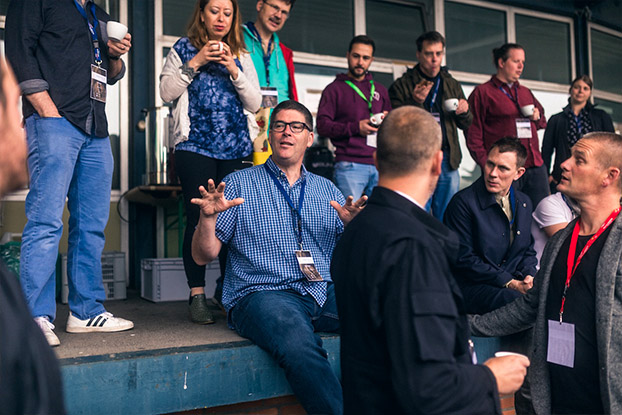Assistant Professor of Organization & Management Emily Bianchi spoke last week on “The Psychology of Well-Being.” Bianchi was this year’s Executive Women of Goizueta faculty speaker.
EWG provides a forum for female students and alumni to be leaders in their careers, communities and lives. The aim is for members to motive each other towards success and to be accomplished women, professionally and at home.
[toggle title=”Executive Women of Goizueta to host annual conference”]The marquis event of the EWG calendar is the “Advancing Women in Leadership” conference. This year the conference will be held on Nov. 14 at the Woodruff Arts Center in midtown Atlanta from 8 a.m. to 3 p.m. This one-day event includes prominent keynote speakers, workshops and networking with some of Atlanta’s most dynamic professional women. The theme of the event, “Wear Risk Well,” explores the topic of risk-taking and how women who embrace it can achieve career and personal success. Register for the conference here.[/toggle]
EWG invites a Goizueta Business School faculty member to lecture on various topics of interest. This year, Bianchi presented her own research and findings from other scholars on the nature of happiness.
“Americans,” Bianchi began, “are obsessed with being happy.”
Walking into a local bookstore, one will often see a whole section devoted to personal well-being and happiness. While these types of books are not often based on empirical research, Bianchi and her colleagues found Americans do have good reason to be obsessed with happiness: the happier a person is, the longer they live and the better they function.
“Societies in which people report greater well-being have lower rates of suicide and lower rates of depression,” Bianchi said.
She noted, however, happiness levels are generally stable over time.
This stability can be explained, in part, by a person’s genetic disposition. A 1996 study of identical and fraternal twins found a strong genetic basis for well-being. A person’s genetics can code for happiness set points.
Bianchi likens it to cholesterol level.
“We all have a genetic propensity to either have high cholesterol or not to have high cholesterol,” Bianchi said. “But there are certainly things we can do to keep our cholesterol low.”
Bianchi also presented research showing happiness is only slightly affected by circumstance.
Researchers in the late 1970s conducted studies of Illinois lottery winners and found that, while there was likely to be a spike in the immediate happiness and excitement of the winner, within a year the winners returned to a baseline level.
“Our baseline expectations change over time. What used to make us happy, we adapt to, we get the next thing, we adapt to that, and pretty soon our standards become pretty high,” Bianchi explained.
Even with this hardwired adaptability, there are ways a person can increase his or her happiness. Exercising, volunteering and writing gratitude journals are small ways that have been proven to boost happiness. But Bianchi argues a change in mentality is required for long-term results.
Naturally, people are inclined to make upward social comparisons. This generally results in a feeling of low self-regard.
“The happiest people just don’t compare themselves. It can be done, but it has to be done consciously,” Bianchi said.
Another key to improving happiness is improving social connections.
Psychologists say, overall, people are happier when they have meaningful social relationships and are engaged in friendships. In 2004, however, sociologists found Americans averaged zero close friends. Findings such as these, Bianchi said, can help answer the question, “Why aren’t Americans happier?”
“There’s pretty clear evidence that we’re much less socially connected than we used to be,” she said. “We certainly spend much less time in our communities, socializing with our neighbors than we used to and we are significantly more likely to live alone than we were a generation or two ago.”
This is not something to ignore.
“When life gets busy, [social connections] are easy things to let fall by the wayside,” Bianchi said. “But I think people do it at their own peril and I think this can help explain why we’re not as happy as we’d like to be and why we’re so obsessed with happiness, as a culture.”
About Emily Bianchi
Emily Bianchi joined the Goizueta Business School in 2011. She holds a PhD in Management from Columbia University and a BA in Psychology from Harvard University. Bianchi’s research investigates how entering adulthood in a recession influences later attitudes and behaviors as well as how current economic conditions affect interpersonal interactions, social support, and cooperation. Prior to graduate school, Bianchi was a Senior Consultant for Booz Allen Hamilton.











